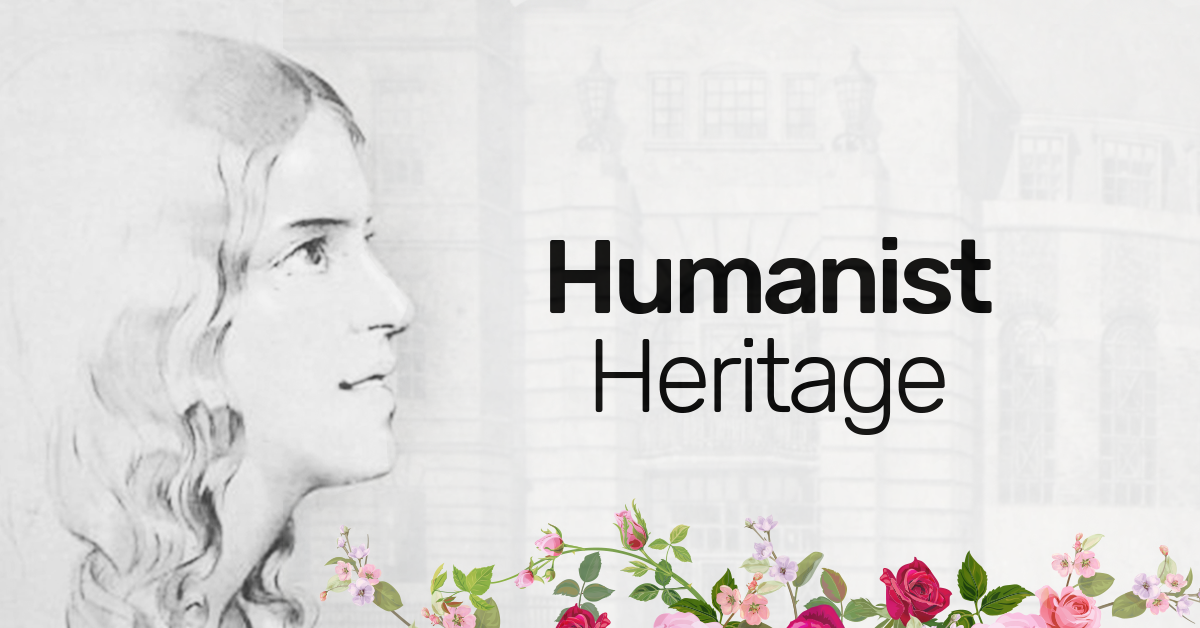
London-based theatre group Electric Voice Theatre are celebrating the life and music of the radical freethinker, feminist, and composer Eliza Flower (1803-1846) on 27 October. Ahead of their performance at Conway Hall, we caught up with artistic director Frances M. Lynch, production manager Herbie Clarke, and historian Oskar Jensen to talk about the show entitled: Flowers of the Seasons: Politics, Power & Poverty.
Eliza Flower (1803-1846)
Eliza Flower was a composer, a radical, and a significant influence on William Johnson Fox and the progressive values of South Place (now Conway Hall). A gifted musician, she did much to raise the priority of music there, composing numerous songs and staging popular performances. Along with her sister, Sarah Flower Adams, Eliza was a part of an era of developing humanism at South Place, arising from the questioning of traditional religious ideas and a wider interest in social justice and reform.
Hi guys! How did you first come across the music of Eliza Flower?
Frances M. Lynch: I first encountered Eliza Flower in an online search for women composers from Essex during the 2020 lockdowns. Intrigued by the obvious quality and innovation of the work, once normal life resumed, I investigated further at the British Library, progressing to a collaboration with archivists at Conway Hall Ethical Society and the discovery that Eliza Flower had been a highly regarded, prolific composer and radical feminist. This was quite unexpected!I have found out so much about her inner life from her music – but there is so little written about her and almost nothing in her own words. Our partnership with Oskar Jensen has proved brilliant in broadening our understanding of her, as he also has a wide knowledge of the period which enriches the music as we discover and record it.
Oskar Jensen: I was at a conference in 2015, at King’s College London, when Kate Bowan, an Australian scholar, first brought her to my attention. Ever since, I and several of my colleagues have been enchanted by her life, story, and music. It will still be a while before I can give her my full attention, but the years in between have featured unfolding encounters with her music, on the page and now – wonderfully – in the air, as well as fresh scraps and glimpses of life: letters, old newspaper pieces, pictures… Meeting Frances and Herbie has been utterly brilliant: people with the will and enthusiasm to get started on something I’ve long been putting off. There’s so much more to come.
Can you tell us about Flowers of the Seasons: Politics, Power & Poverty?
Frances M. Lynch: Flowers of the Seasons: Politics, Power and Poverty is an informal programme of songs, poetry and story-telling centred around Flower’s Free Trade Songs of the Seasons. This unusual song-cycle was written to be performed, and the sheet music sold, at the Anti-Corn-Law League’s extraordinary Bazaar, held over 17 days in the Royal Opera House Covent Garden in 1845. The texts, by her sister, the poet, Sarah Flower Adams combine a familiar art song trope with the struggles of poverty stricken workers. These themes and her eclectic musical structures and remarkable harmonic and melodic material will be reflected in a new set of ‘Songs of the Seasons’ commissioned from UK composers Anna Appleby, Amanda Johnson, Lilly Vadaneaux and myself.
Herbie Clarke: Frances was the one who started to focus on Eliza Flower and l came on board to help promote her work. I discovered that she was a prolific composer. One of the things Eliza Flower did was to compose a song each month and we are recording these and putting them on our website so everyone can now listen to her music. Focusing on Eliza Flower has personally given me an insight into what a remarkable character she was and all the things she stood for, like women’s and workers’ rights.
What role do you see music having in connecting people to the past?
Oskar Jensen: The great thing about music, and performance, is that they can literally only exist in the present. That’s true of everything in a way, I suppose, but nothing else is so reliant – and so insistent – upon the now. Hearing music written in the past, but performed today, is like a super-charged version of writing a historical novel in the present tense: it asserts, so strongly and compellingly, that this is real, happening, momentous.
We hear in different ways to people in other times and other places, of course – audiences have changed much more than performers – but it’s still about connection and emotion. In the early nineteenth century people were very excited about theories of nerves and passions, and the direct synaptic effect of music upon the body. The science may be squiffy, but the idea is right: in that moment, we are affected. I find this indescribably powerful.
Herbie Clarke: I believe music is very important. So much really good music and composers get forgotten. Once this music is brought to the attention of the wider public they cannot believe what they have been missing out on and realise that there is more to music than what’s being fed to them.
Frances M. Lynch: We all use music to connect with our own past – nursery rhymes that take us back to childhood, songs that remind us of important events – meeting our partners or special occasions like weddings, or funerals. It therefore seems obvious to me that music will connect us to stories that are not our own, that link to the past.
Do you have a favourite humanist past or present?
Frances M. Lynch: This is a tricky question – obviously with our focus today on Eliza Flower and her sister Sarah Flower Adams these are two women who are inspirational, for me of course particularly Eliza as a composer. She is definitely my favourite today – her story shows us how to make your life a protest, to live your beliefs fully – which took enormous courage, though perhaps didn’t bring the personal happiness she hoped for. There is Harriet Martineau too – her writing partnership with Eliza was perhaps the most powerful of the 19th century.
But the one who has stayed with me over many years is Rosalind Franklin. We worked on a project with four women scientists from King’s College London, four women composers, and four singers, to create responses to Franklin’s work. We worked as a team and had access at that time to the labs where Franklin worked and to a member of staff who worked with her team in later years – and of course we collaborated with Professor Brian Sutton who is an expert in Franklin’s life and work. I was left with an enormous respect for Franklin, again that courage, determination and drive to continue in the face of many difficulties, to plough her own path and make the most of the undoubted talents she had.
Thank you for speaking with us!

Notes
The Humanist Heritage project began in 2019, with Humanist Heritage – an online resource charting hundreds of years of humanist history – launched in 2021. Since January 2023, it has been supported by The National Lottery Heritage Fund, working with project partner Conway Hall on Humanist Heritage: Doers, Dreamers, Place Makers.
Oskar Cox Jensen is a writer, historian, and trustee of Conway Hall. His most recent book is Vagabonds: Life on the Streets of Nineteenth-Century London, shortlisted for the 2023 Wolfson History Prize.
Flowers of the Seasons: Politics, Power & Poverty will take place at Conway Hall on 27 October 2023 at 7:00pm. You can read more about Flowers of the Seasons on Electric Voice Theatre’s website, and book tickets to see the performance at Conway Hall.
The Humanist Heritage project began in 2019, with Humanist Heritage – an online resource charting hundreds of years of humanist history – launched in 2021. Since January 2023, it has been supported by The National Lottery Heritage Fund, working with project partner Conway Hall on Humanist Heritage: Doers, Dreamers, Place Makers.
Electric Voice Theatre are an award-winning contemporary music-theatre a cappella ensemble, commissioning, creating, researching, and performing vocal music by women composers for theatrical performance, participating in creative multi-disciplinary collaborations, and delivering workshops connecting children and adults to their local creative and cultural environment.
